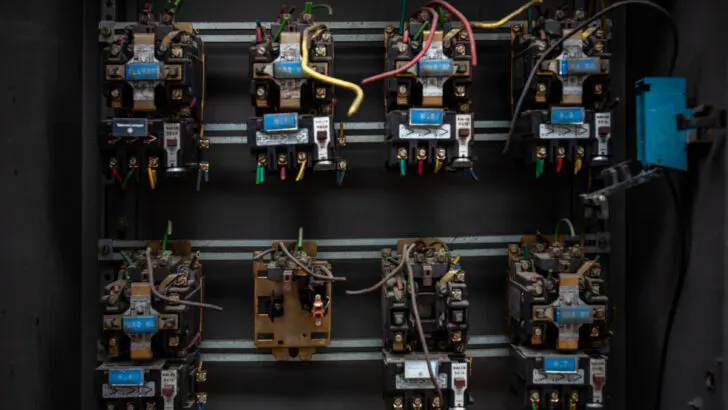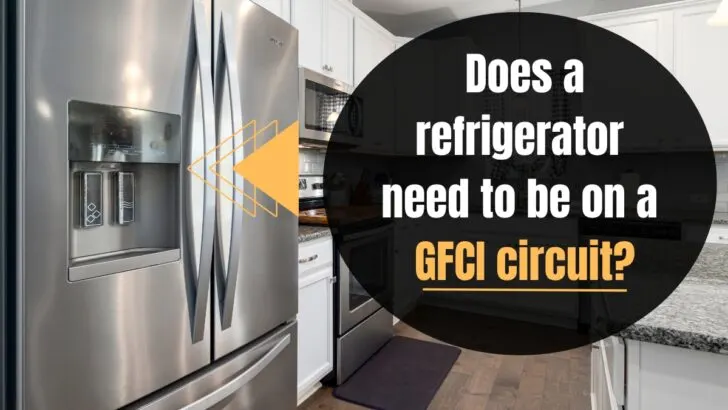GFCI circuits have become widely used in households and businesses across the country, but does a refrigerator need to be hooked up to one?
A refrigerator doesn’t need to be hooked up to a GFCI circuit in a private residence, even though it is recommended to do so given that it’s safer for your home and protects the appliance. However, GFCI circuits are often required for fridges in commercial kitchens.
GFCI circuits are a safer solution for supplying power to appliances and devices, which is why the National Electrical Code (NEC) often legally requires some businesses and institutions to hook up fridges to GFCI.
What Is a GFCI Circuit?
GFCI stands for a Ground Fault Circuit Interpreter, which is designed to prevent hazards caused by electrical surges and overloads. Prior to GFCI circuits, household breaker trips and electric shocks were much more common.
A GFCI circuit will protect any appliances that you have connected from being overloaded with electrical current. Overloaded electric currents have traditionally been one of the leading reasons for electrical fires, given that a surge would heat up wires and components due to power instability.
One of the most common appliances that you can hook up to a GFCI circuit is a refrigerator. Large appliances such as fridges have notoriously been the cause of overloading breakers, which creates unnecessary hazards.

A GFCI circuit is much safer for preventing disruptions and electrical surges caused by moisture. When moisture makes contact with a GFCI circuit, it will automatically trip itself so that a power surge does not cause serious damage to your property and appliances.
GFCI circuits do this by monitoring the flow of current that passes through. Once it detects that there is excessive current, it will immediately take measures to lower the current and trip itself.
Does a Refrigerator Need to be Connected to a GFCI Circuit?
A refrigerator does not need to be on a GFCI circuit. The NEC dictates how GFCI circuits should be used and they recommend the best approaches to consume power safely in residential and commercial settings.
Although the NEC does not require that fridges be on GFCI circuits in private residences, they do encourage homeowners to do so. Large appliances like refrigerators are generally placed in areas close to moisture and they can even create moisture themselves.
This reason alone provides plenty of incentives for all fridges to be connected to a GFCI circuit. Whether the moisture comes from humidity, a leak, or the fridge itself, this can become a serious hazard if it makes content with an outlet or circuit that is not GFCI.
In addition, fridges are among the most energy-demanding appliances in your home, which can easily cause a breaker to overload.
If your circuit breaker trips due to your fridge and it’s not GFCI, this can create a damaging surge that can harm your fridge, as well as other appliances in your home.
Are Refrigerators Legally Required To Be on a GFCI Circuit?
Many people speculate whether refrigerators are legally required to be on a GFCI circuit. As I mentioned above, you are not legally required to have your fridge on a GFCI circuit if you live in a private residence.
However, the NEC has made updates to laws and regulations regarding GFCI circuits recently. Many commercial businesses and kitchens are legally required to be on a GFCI circuit. This requirement was put into effect to prevent potential fire hazards and power surges in settings where large-scale appliances are common.
Commercial businesses and professional kitchens, in particular, use large fridges and have a plethora of appliances connected to their breakers. The NEC states that all kitchens and areas with sinks and permanent provisions must adhere to this protocol.
Can a Refrigerator Cause a GFCI Circuit to Trip?
A refrigerator can cause a GFCI circuit to trip, but it is quite uncommon with non-commercial fridges. So long as you are not overloading the circuit, a standard fridge used in private households will rarely, if ever, trip a GFCI circuit.

If this does happen, it’s due to a power surge, in which case your home and your appliance would be protected by the GFCI circuit.
However, it’s important to notice a surge when it happens, as it will turn off your fridge. All you need to do is reset your GFCI circuit and your fridge will power back on.
Reasons to Keep Your Refrigerator on a GFCI Circuit
The NEC requires some commercial businesses and all commercial kitchens to have their fridges connected to a GFCI circuit. However, they encourage private homeowners to do the same for various safety reasons.
A GFCI circuit is guaranteed to lower your chances of power surges and electrical fires, which is more than enough reason for most owners to connect their fridges to one. With that said, these are some key reasons to keep your refrigerator on a GFCI circuit.
Malfunctioning Fridge Components
Your fridge is built with components that will eventually become unstable. This is particularly common with older fridges that have outdated parts, but it can technically happen to any refrigerator.
When internal components in your fridge malfunction, they can create imbalances in electrical currents. If your fridge is not hooked up to a GFCI circuit, the electric shock can trigger a surge.
This has been a leading cause of fires in domestic households and commercial businesses, which is a primary reason that GFCI is now required for professional kitchens.
The surge caused by your fridge’s malfunctioning components can also end up damaging other appliances and devices in your home. In some cases, surges have been responsible for destroying 90% of all devices that were connected to a power source.
A GFCI circuit would have prevented both the fire and surge from having any damaging effects on your property.
Fridge Running at Full Power
Virtually every fridge connected to a power source never gets a break. If a fridge is running at full power for years without being connected to a GFCI circuit, a power surge may be inevitable.
A power surge that is not protected by a GFCI circuit can pose many safety risks to you and your property. Given how much energy a fridge demands at full power, power surges have been extremely common in the past when not connected to a GFCI circuit.
Unless you plan on periodically unplugging your fridge, a GFCI circuit is your best bet for preventing a power surge.
What Do the Color Lights on GFCI Mean?
When you install a GFCI circuit in your home, it will have a corresponding outlet, which can be identified by its “Test” and “Reset” buttons, as well as a colored light.
The color light on a GFCI outlet indicates the status of the circuit. This is a safety feature that every GFCI circuit will have so that you can immediately understand the condition of the outlet and whether it is safe to use.
Green Light
The green light on a GFCI circuit means that the outlet is safe to use and is in normal operation.
This will give you the go-ahead that the appliance is compatible with the circuit and is not overloading it.
Red Blinking Light
When you see a red blinking light on a GFCI circuit, it normally just means that it is performing a self-test. This should not last long, and the red light should quickly turn green if everything is in order.
If the red blinking light continues for a prolonged period, then this could imply that there is something wrong with the GFCI circuit.
Solid Red Blinking Light
A solid red blinking light is not a good sign. This generally means that there is an issue with the circuit and outlet.
You should unplug anything that you have connected to the GFCI outlet and reset the circuit to see if it resets itself. If it does not reset itself, do not use the GFCI outlet and replace it immediately.
No Light
If there is no light, that means the GFCI circuit has no power. So long as you are not experiencing a power outage, odds are the CFGI circuit tripped.
Once you have confirmed that power is available and the light is still off, simply press the ‘Reset’ button and this should turn the green light back on.
Key Takeaways to Refrigerator Being on a GFCI Circuit
A refrigerator doesn’t need to be on a GFCI circuit in a private residence.
The NEC recommends connecting your fridge to a GFCI circuit given that it’s safer for your home and will protect the appliance in case of a surge.
GFCI circuits are required for fridges in commercial kitchens and businesses.


